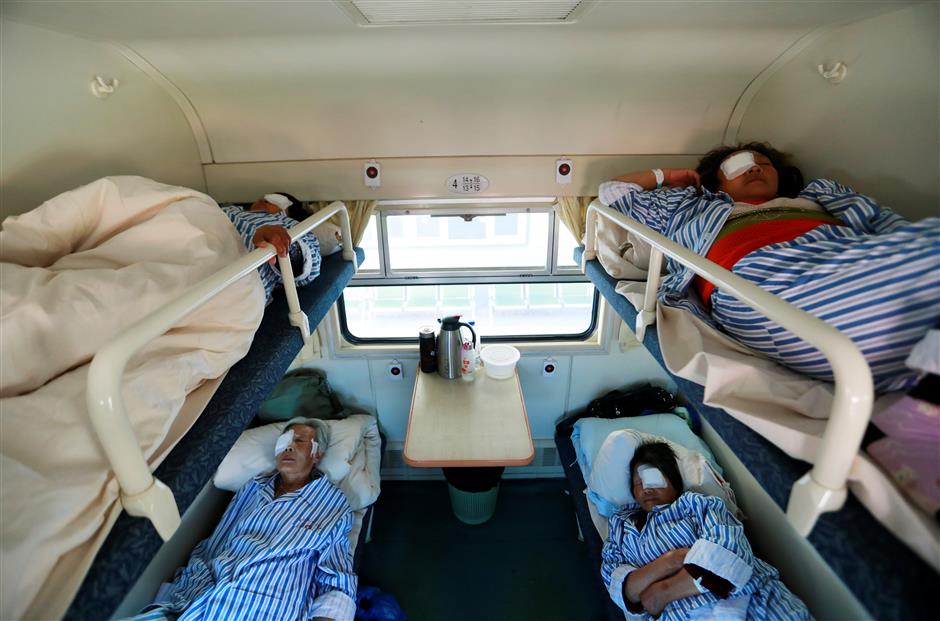Hospital trains a lifeline for cataract victims in rural areas

Ophthalmologist Chen Huiying (R) performs check ups on patients for complications that might affect their cataract surgeries on the Lifeline Express hospital train in Baishan City of Jilin Province, China, 30 August 2017.
Running through mountains and over rivers, a four-carriage train finally stops at an abandoned farm in the tourism city of Guilin. The train is painted with pictures of rainbows that symbolize hope.
Instead of a long queue to buy tickets, a line of low-income cataract patients wait for free surgery on the train, a mobile hospital, commonly known as the Lifeline Express.
Xiong Zhilian, 49, was among the first batch of cataract patients to receive free surgery at the hospital. “I recovered my sight. I’m so grateful for all the help given to me by doctors and volunteers,” said the villager from the county of Lingchuan in southern Guangxi Zhuang Autonomous Region.
Xiong, who had been living with cataracts for four years, could not work to support himself and his parents. He had to rely on a basic living allowance from the local government.
Doctors of the mobile hospital — which has an operating room and a ward with 52 beds — have operated on 520 cataract patients since the train arrived in Guilin on October 12. The youngest patient was a year-old baby, while the oldest was 91.
Of all ophthalmic diseases, cataracts are the most likely to cause people to go blind in China. It is not just elderly people who are prone to the disease. Young people also suffer from cataracts because of genetic defects or damage caused by ultraviolet rays.
About 5 million Chinese on the mainland suffer from cataracts, a number that is growing by 10 percent every year, mostly in the rural areas.

Patients rest in their bunk beds after their cataract surgeries on the Lifeline Express hospital train in Baishan City of Jilin Province, China, 29 August 2017.
“The mobile hospital travels to remote poor regions every year and stays for two or three months at each stop,” said conductor Wang Yuezhen. Before its arrival in Guilin, the train had been to Kashgar in southern Xinjiang and Baishan City in Jilin Province.
On the mainland, there are four Lifeline Express trains. Three were donated by Hong Kong people, and one was donated by Chinese energy firm Sinopec.
As a national poverty relief program of medical assistance, the Lifeline Express trains have traveled across 28 provincial regions on the mainland and helped more than 180,000 cataract patients to recover their sight since the program began 20 years ago.
In addition to offering free operations, the Lifeline Express program has helped to build 69 ophthalmic surgery centers and invited foreign experts to help train local doctors.
Addressing poverty caused by illness — which affected about 40 percent of the rural poor in 2015 — is the toughest task in China’s poverty alleviation campaign.
Having received treatment, Xiong Zhilian can see clearly again. His father, a cataract patient at his 80s, recently received an operation notice from the mobile hospital.
Their family has found new hope in life, and Xiong plans to plant oranges on the local mountain before moving to a big city to find a job and make a fresh start.















